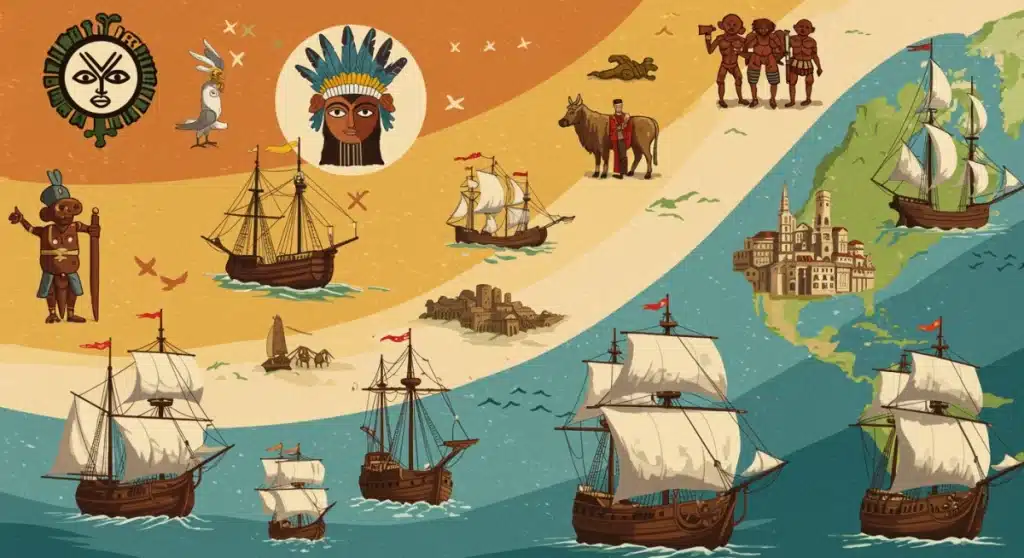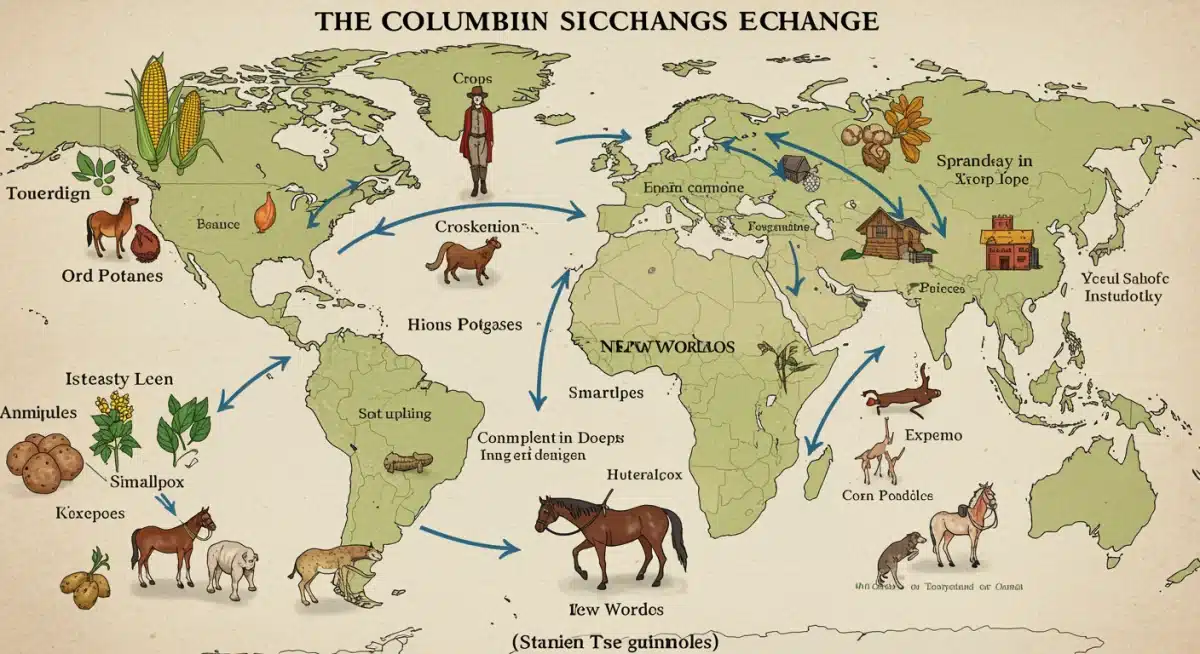New World Discoveries: Impact on Modern American Society

The profound and lasting influence of New World Discoveries Impact on modern-day American society continues to be a subject of critical analysis and ongoing debate. From its foundational cultural tapestry to its complex economic systems, the threads of early exploration and colonization are inextricably woven into the fabric of contemporary America, shaping identities and institutions.
The Genesis of a Diverse Cultural Landscape
The initial encounters between European explorers and indigenous populations in the New World laid the groundwork for a uniquely diverse cultural landscape. This convergence of disparate societies, though often fraught with conflict, irrevocably altered the trajectory of both groups, giving rise to a new American identity.
Early European settlements, primarily English, Spanish, and French, brought distinct languages, religions, and social structures. These were superimposed upon, and sometimes blended with, the rich and varied cultures of hundreds of Indigenous nations. The resulting cultural mosaic is a defining characteristic of modern American society.
Indigenous Contributions and Enduring Legacies
Despite centuries of systematic oppression and displacement, indigenous cultures have left an indelible mark on American society. Their knowledge of agriculture, land management, and sustainable living practices often influenced early European settlers, and many place names, foods, and even political concepts derive from indigenous origins.
- Agricultural Innovations: Crops like corn, potatoes, tomatoes, and squash, cultivated by indigenous peoples, became staples worldwide and transformed global diets.
- Environmental Stewardship: Traditional ecological knowledge continues to inform modern conservation efforts and land management strategies.
- Linguistic Influences: Numerous American place names, from Mississippi to Seattle, are derived from indigenous languages.
- Democratic Ideals: Some historians argue that certain aspects of indigenous governance, particularly the Iroquois Confederacy, influenced early American democratic thought.
Economic Foundations and the Transatlantic Trade
The economic impact of New World discoveries was immediate and transformative, establishing trade routes and commodity markets that fueled European empires and simultaneously built the economic bedrock of what would become the United States. The exploitation of vast natural resources and the development of new agricultural systems were central to this process.
The transatlantic trade, particularly the brutal institution of chattel slavery, became a cornerstone of colonial economies. Cash crops like tobacco, cotton, and sugar, cultivated by enslaved Africans, generated immense wealth for European powers and American colonists, though at an unimaginable human cost.
The Rise of Capitalism and Global Commerce
The influx of new goods and resources from the Americas significantly accelerated the development of capitalism in Europe. This era saw the rise of powerful trading companies, new financial instruments, and a globalized economy that connected continents in unprecedented ways. The American colonies quickly became vital nodes in this burgeoning global network.
The demand for raw materials and markets for finished goods drove further expansion and technological innovation. This economic engine, born from colonial exploitation, continues to shape global trade and economic policies today, with its historical inequities still reverberating through contemporary financial structures.
Political Structures and Ideological Development
The political landscape of modern America is deeply rooted in the ideas and conflicts that emerged from the New World discoveries. The establishment of self-governing colonies, the struggle for independence, and the formation of a new republic were all shaped by the unique circumstances of life in the Americas.
European political philosophies, particularly Enlightenment ideals, found fertile ground in the colonies, where distance from monarchical rule allowed for experimentation with new forms of governance. The experience of colonization itself, and the subsequent fight against it, fostered a distinct American political identity.
Colonial Governance and Revolutionary Spirit
The British colonies, in particular, developed a degree of self-governance through elected assemblies, fostering a sense of autonomy among settlers. This experience, combined with grievances over taxation and representation, culminated in the American Revolution. The founding documents of the United States, such as the Declaration of Independence and the Constitution, reflect these Enlightenment principles and the colonial experience.
The structure of American federalism, the emphasis on individual rights (for some), and the concept of popular sovereignty are all direct descendants of the political evolution that occurred in the New World. These foundational elements continue to influence political discourse and institutional design in the United States.
Social Transformations and Demographic Shifts
The arrival of Europeans instigated massive demographic shifts and profound social transformations across the Americas. The introduction of new populations, both voluntary and involuntary, created a complex social hierarchy that has evolved over centuries but whose origins remain visible in modern American society.
The decimation of indigenous populations due to disease and warfare, coupled with the forced migration of enslaved Africans, fundamentally reshaped the continent’s human landscape. These events created enduring social structures, racial categories, and inequalities that persist today.

The Columbian Exchange and its Human Cost
The biological exchange between the Old and New Worlds, known as the Columbian Exchange, had devastating consequences for indigenous peoples, who had no immunity to European diseases like smallpox and measles. This ecological and epidemiological catastrophe led to massive population declines and societal disruption.
- Disease Epidemics: European diseases wiped out an estimated 90% of the indigenous population in some regions, fundamentally altering the demographic balance.
- Forced Migration: The transatlantic slave trade forcibly brought millions of Africans to the Americas, creating a new and oppressed social class.
- New Social Hierarchies: Colonial societies developed rigid racial and ethnic hierarchies, with Europeans at the top and indigenous peoples and Africans at the bottom.
Technological and Scientific Advancements
The challenges and opportunities presented by the New World spurred significant technological and scientific advancements, both in Europe and later in the burgeoning American nation. Navigation, cartography, and shipbuilding underwent rapid innovation to facilitate exploration and trade across vast oceans.
The discovery of new flora and fauna expanded scientific knowledge, leading to advancements in botany, zoology, and medicine. The need to adapt to new environments also fostered ingenuity in agriculture, construction, and resource extraction, laying the groundwork for a technologically progressive society.
Innovation in Exploration and Resource Management
The drive to explore and exploit the New World led to improved shipbuilding techniques, more accurate navigational tools like the astrolabe and compass, and sophisticated cartographic methods. These innovations were crucial for maintaining contact and trade across the Atlantic.
Once settled, colonists developed new farming techniques adapted to American soils and climates, often learning from indigenous practices. The need to process new resources, from timber to minerals, also stimulated early industrial development and the creation of new tools and machinery. This spirit of innovation continues to be a hallmark of American society.
Environmental Impact and Resource Exploitation
The discovery and subsequent colonization of the New World had a profound and often detrimental impact on its natural environment. European agricultural practices, resource extraction methods, and the introduction of non-native species dramatically altered ecosystems across the continent.
Vast forests were cleared for timber and farmland, leading to deforestation and soil erosion. The pursuit of furs, minerals, and other resources often occurred without regard for ecological balance, setting precedents for resource exploitation that continue to challenge environmental sustainability in modern America.
Ecological Transformation and Modern Legacy
The introduction of European livestock like cattle and pigs, along with invasive plant species, transformed native landscapes and competed with indigenous flora and fauna. The scale of this ecological alteration was immense, forever changing the biodiversity of the Americas. This historical pattern of resource use has shaped current environmental policy debates.
Modern environmental movements in the United States often grapple with the long-term consequences of this early exploitation, seeking to balance economic development with ecological preservation. The legacy of New World discoveries includes not only societal formation but also a complex relationship with the natural environment that continues to evolve.
| Key Impact Area | Brief Description |
|---|---|
| Cultural Diversity | Fusion and conflict of European and Indigenous cultures shaped a unique American identity. |
| Economic Foundations | Transatlantic trade and resource exploitation established the basis for American capitalism. |
| Political Development | Colonial self-governance and Enlightenment ideals influenced American democracy. |
| Social Hierarchy | Created enduring racial and ethnic inequalities through slavery and indigenous displacement. |
Frequently Asked Questions About New World Discoveries’ Impact
New World discoveries introduced crops like corn, potatoes, and tomatoes to global agriculture, transforming diets and farming. Colonists also adapted indigenous farming techniques, while European methods introduced new livestock and land management practices, drastically altering the agricultural landscape of the Americas.
The Columbian Exchange facilitated the massive transfer of plants, animals, diseases, and technology between the Old and New Worlds. While it enriched global diets and trade, it also led to devastating epidemics among indigenous populations and established the transatlantic slave trade, profoundly shaping American demographics and social structures.
The vast resources of the New World, including precious metals, timber, and agricultural products, fueled European mercantilism and capitalism. This influx of wealth and new commodities stimulated global trade, financed empires, and led to significant economic growth and industrial development in Europe, with long-term global implications.
The New World experience fostered unique political ideologies, blending European Enlightenment thought with colonial demands for self-governance. Concepts of liberty, popular sovereignty, and representative democracy gained traction, eventually culminating in the American Revolution and the formation of a republic based on these principles.
The historical patterns of resource exploitation and ecological transformation initiated by New World discoveries continue to influence American environmental policy. Debates around conservation, land use, and sustainable practices often trace back to the initial impact of colonization on native ecosystems and the legacy of extensive resource extraction.
Looking Ahead: Enduring Legacies and Evolving Narratives
The enduring legacies of New World discoveries are not static; they are continuously re-evaluated and reinterpreted in modern American society. As new research emerges and diverse voices gain prominence, our understanding of this foundational period evolves. The ongoing dialogue surrounding historical injustices, cultural appropriation, and environmental stewardship reflects a society grappling with its complex origins. Moving forward, a comprehensive and nuanced understanding of this historical impact remains crucial for addressing contemporary challenges and shaping a more equitable future.